When dealing with toxic relationships, a question arises, “Can an abusive partner change for good?”. Well, here are 11 genuine signs they’re transforming!
“I promise. This time I will change. Please don’t leave me. Give me one more chance. A last one. I WILL change. You’ll see.”
If you have ever been in an abusive relationship, you have probably heard this many times before. While abusers usually don’t really change, what if they actually change this time around? Are there any genuine signs your abusive partner is changing?
Can an abuser change?
The quick answer is yes. But just like everything else in life, it is a lot more complicated than it sounds. A narcissistic, toxic, abusive individual may genuinely want to change due to certain life experiences.
They may regret their abusive behavior in the past and may actually feel sorry for hurting their partner and loved ones. They may want to feel better, feel happy and may want to build a healthier relationship. But it rarely happens. Doesn’t it?
Related: Are You In An Abusive Relationship And Don’t Even Know It? 4 Identifying Signs
It all depends on the individual and how strongly they want to change. However, as a victim of abuse you have heard these tall tales of your abuser promising to change almost a millions times.
But they never do. While they may pretend to be nice and kind to you for a few days, soon the same story starts repeating itself all over again and the cycle of abuse reboots in all its glory. So can an abuser change for real?
Lasting and true transformation can happen in someone who is willing to put in the effort and commitment required to change their abusive behavior.
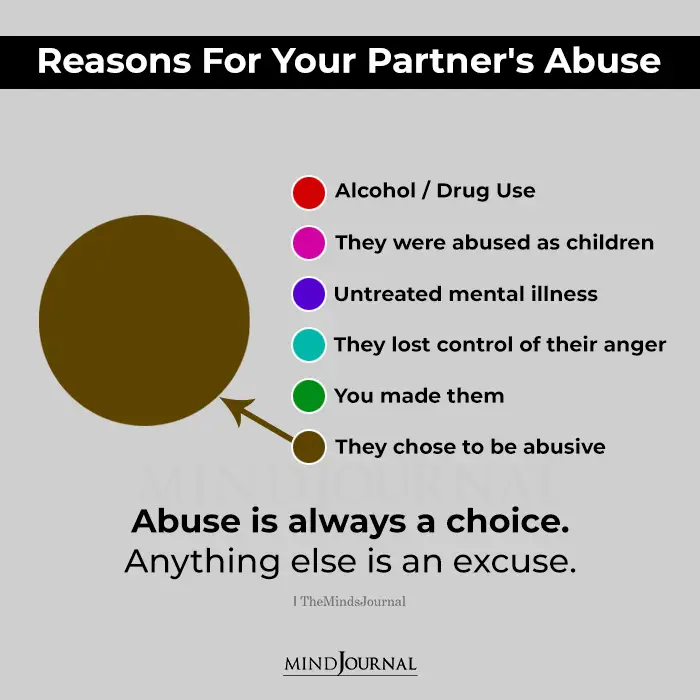
However, this can be a big gamble for you as you can never be sure if they are actually changing or not. This is why it is crucial that you learn to identify the signs your abusive partner is changing.
Once you know what signs you need to watch out for, you can set up some strong boundaries and observe your abusive partner from a safe space, while building a healthier life for yourself and improving your mental health.
After you have identified the signs of change in an abusive partner, you can then determine whether they have actually changed or not. Then you can decide whether you should stay in the relationship to make it work or walk away to protect yourself, based on how your partner has changed in reality.
Can An Abusive Partner Change? 3 Major Signs An Abuser Is Changing
So what are the signs of change in an abusive partner? Detecting practical change in an abuser can be rather challenging as they are expert in playing mind games, manipulation and love bombing. They may make tons of promises and initially show that they are committed to making real change.
While these may seem like concrete actions that can convince you they are becoming a better, more loving partner, they are simply grooming you to stay in the relationship.
Related: How Narcissistic Abuse Changes You
How can you be sure if your abusive partner is truly making good on the promise they made about changing themselves? Here are some practical and genuine signs your abusive partner is changing for good –
1. They take full responsibility for their abusive behavior
Does your partner admit to what they have done without any explanations, excuses, justifications or reasons?
Change will begin only when they admit to their toxic behavior such as gaslighting, criticizing and lying and they acknowledge the objective for such toxic behavior.
Usually a toxic partner will abuse their spouse or partner to gain control over them and to hide their own insecurities. This is one of the primary signs your abusive partner is changing.
Taking complete responsibility for their toxic behavior will involve these steps –
- Fully accepting what they have done
- Acknowledging that they use abusive behavior to dominate you
- Admitting that it is wrong to abuse you or anyone else
- Avoiding shifting blame to you, their job, life stress or any thing else for their behavior
- Avoiding minimizing the situation, taking you lightly or denying their abusive behavior
- Accepting that it was their decision to abuse instead if saying they have no control over it or were forced by others
- Admitting to all their lies and avoiding cooking up stories further
- Avoiding hiding their actual toxic behavior in front of others
- Realizing that changing and recovery may be a long and difficult process, but they are willing to work on it
Related: 8 Tips To Protect Yourself When Staying With An Abusive Person
2. They realize how their abusive behavior has affected you
Does your toxic partner honestly understand how much they have hurt you, your children and your loved ones with their abuse? One of the most important signs your abusive partner is changing is that they understand the damage they have cost you.
They should be able to feel your pain and suffering caused by their violent abuse without you explaining it to them. This shows that your abuser has developed empathy, which can drive their willingness to change into concrete outcomes, not just hollow promises.
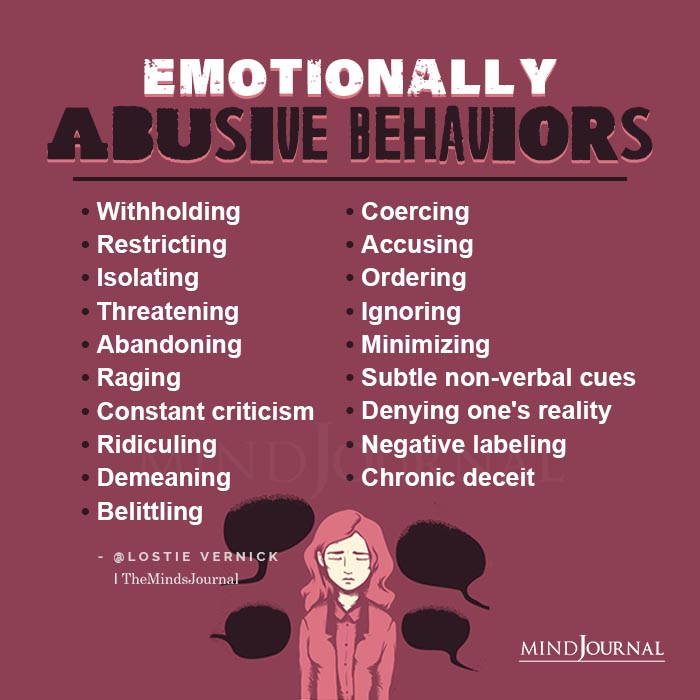
While some people may realize that abuse is wrong, they may not be able to see the effect they have on you. This is why an abuser must expand their understanding of abuse. This process can include the following steps –
- Clearly understanding the effects of their abuse
- Understanding the different ways you and your loved ones were hurt by their abusive behavior
- Realizing the price you had to pay for enduring their abusive behavior
- Understanding how their behavior makes you feel – depressed, afraid, angry, unable to trust them etc
- Talking in details about the impact of their abuse in the short and long run
- Realizing it will take time for you to overcome the effects of abuse and to forgive them
- Feeling remorseful for the damage they caused and taking effort to fix things such us giving you the respect you deserve and your rights to live independently
Related: 6 Painful Ways Emotional Abuse Changes You
3. They start treating you with respect
One of the non-negotiable signs your abusive partner is changing is that they exhibit respectful attitudes and behaviors. Abuse is primarily a sign of disrespect.
Unless you start noticing genuine and practical respect from your partner towards your emotions, opinions, rights, goals, needs and habits, it can’t be considered as real change. However, you need to cautious not to confuse pampering or love bombing with sincere respect.
Your abusive partner should learn to respect your independence, privacy boundaries and limits. They should not force or manipulate you to do something you don’t want to. You should have the freedom to express your opinions and live your life the way you want to.
You should be allowed to say ‘NO’ when you feel like it and your partner should be able to accept that respectfully. And most of all, your abuser should treat you respectfully in times of conflict and disagreements.
This can also include several other steps such as –
- Acknowledging you as an independent person with your own opinions and rights
- Considering you as an equal in the relationship and not acting like a superior
- Accepting your emotions and opinions, whether positive or negative, even when they may not agree with it
- Respecting your freedom and independence
- Avoiding manipulation, threats, intimidation or other tactics to control you
- Actively listening to you with respect even during arguments
- Providing you the space and right to speak & act freely without them retaliating violently
- Accepting their abusive behavior when you point it out to them and changing it immediately
- Avoiding monitoring or interfering in your personal life and constantly demanding to know your whereabouts
Related: Abuse The Abuser: Should You Give A Narcissist A Taste Of Their Own Medicine?
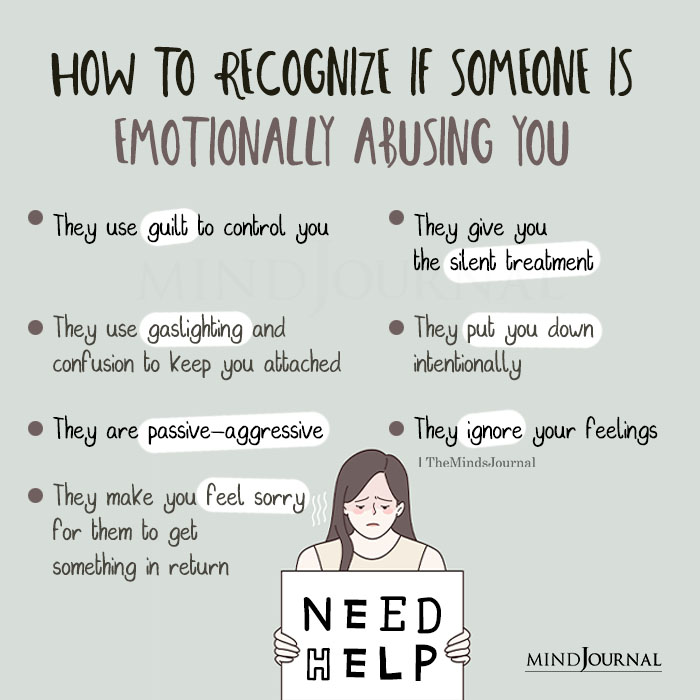
How To Know If Your Abusive Partner Is Changing? 8 More Signs
Apart from the basic signs your abusive partner is changing, there are some other indications that your toxic partner is actually changing abusive behavior. Here are additional signs an abusive partner is changing that you need to watch out for –
4. Changing without conditions
They should be honest and truthful in their efforts to change. The abuser should never have any conditions to honor their commitment to change. They should not hold you accountable for their behaviors and need to pull up their socks in case they relapse.
5. Recognizing internal issues
They need to identify and discuss the abusive strategies they use on a daily basis to control you. They should also recognize the personality issues, insecurities, distorted beliefs and twisted values they have that make them abusive.
Related: Abuse Knows No Gender: Real Life Examples Of How Women Abuse Men
6. Focusing on your needs
They should pay attention to your needs, emotions and abilities. They must encourage you to pursue your goals and logically approach your opinions that may counter their beliefs. This is one of the most subtle signs your abusive partner is changing.
7. Accepting the consequences
They should be willing to accept any and every consequence of their abusive behavior. They need to accept the aftermath such as you refusing to be intimate with them, you and your loved ones being cautious, stern and strict with them or even you choosing to walk away from them, whether temporarily or permanently.
8. Being humble and kind
They should feel indebted to you for all the abuse and trauma they have caused you and your loved ones. They should be humble, supportive, kind and loving.
They should focus on your needs and avoid any unhealthy needs they may have. They should not demand any privileges or have a sense of entitlement or double standards.
Related: Verbal Abuse Disguised as Jokes: When The Joke Isn’t Funny
9. Understanding how they see you
They need to recognize that they do not have a healthy image and perception of you. They should admit that they see you as inferior to them and replace toxic mental habits with empathy, compassion and optimism.
10. Admitting abuse is intentional
They recognize that abusive behavior is not necessarily a loss of control or inability to manage emotions, but it is a matter of choice. They accept abuse is an intentional and deliberate action. Not making any excuses is one of the most vital signs your abusive partner is changing.
11. Being open to feedback
They should be able to accept criticism and feedback about their behavior openly and honestly without getting their ego hurt. They need to have a positive attitude and overcome their insecurities in order to improve.
Related: How To Stop Being An Abusive Person: 10 Steps For Real, Lasting Change
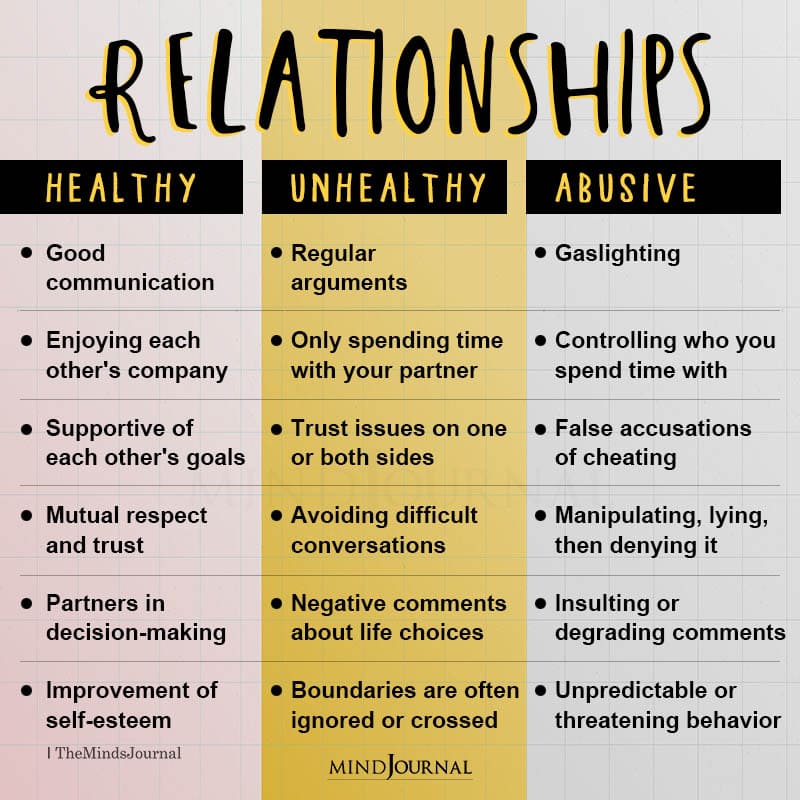
More signs an abuser is changing for real
Here are some additional signs that your partner is actually changing abusive behavior this time –
- Their effort in changing their violent behavior is visible on a daily basis
- They do not give you the silent treatment or block communication
- They stop their controlling or manipulative behavior when you point it out
- You are allowed to be angry at them and express your true emotions without retaliation
- They allow you to nourish and nurture your other relationships and friendships
- They do not demand intimacy or sex from you and respect your response
- They support you mentally, emotionally and financially
- They don’t demand any brownie points for their efforts to change
- They don’t claim to be better and recognize that change may be a lifelong process
- They share and talk about their own emotions, insecurities and fears
- They are willing to maintain boundaries and work on improving themselves, whether alone or with support from others
- They recognize that their behavior is caused by underlying issues like their own childhood abuse, past trauma, mental health issues and personality disorders
- They are willing to seek professional help to change their negative attitude, toxic behaviors and any underlying psychological issues
- They are being patient and willing to wait for a long time for your forgiveness and to rebuild the relationship
- They redefine what love means to them and tend to be more loving, attentive and kind towards you
Now you know the signs your abusive partner is changing. But what if your abusive partner is not showing any of these signs? Are they going back and forth on their efforts? Are they simply talking the talk without walking the walk?
Related: What To Do When You Are Being Emotionally Abused
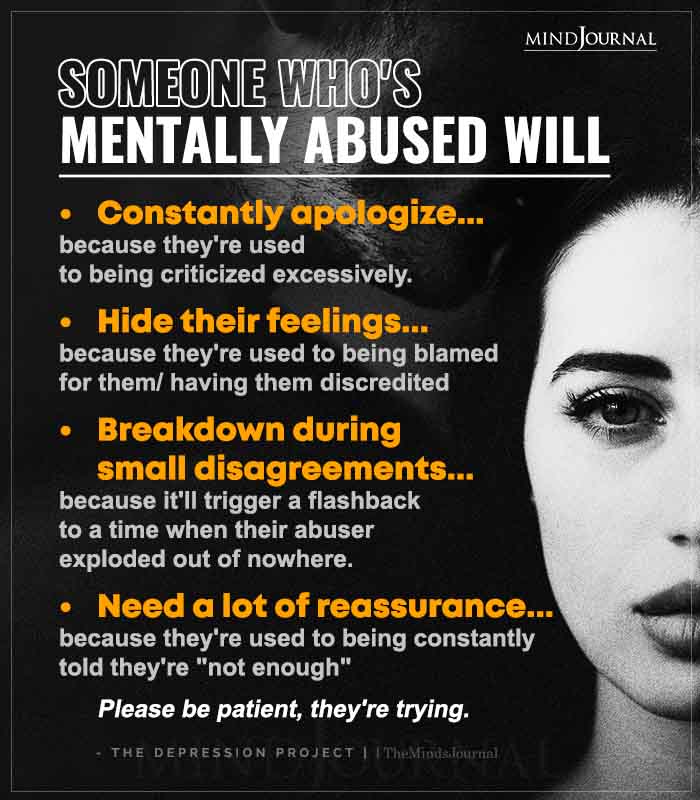
Obvious signs your abusive partner is not changing
While your toxic partner can make a lot of promises, unless they start delivering on them, it is simply another manipulation tactic to keep you from leaving. Here are some common signs your abusive partner is not changing –
1. They don’t think their behavior is abusive but still promise to change.
2. They keep being violent and continue to intimidate and threaten you on occasions.
3. They say that they will only change if you change too, which means you need to be more submissive to them.
4. They pretend to be the victim and desperately try to gain sympathy from you and your loved ones.
5. They continue to lie about things whenever it is beneficial for them.
6. They become angry or avoid you whenever you talk about their abusive behavior.
7. They refuse to talk about the abusive strategies they use on a daily basis.
8. They remind you of all the love and good times about the past and try to charm you with expensive gifts or romantic gestures.
Related: 4 Damaging Effects Of Emotional Abuse And How To Heal
9. They refuse to get medical help or see a therapist or counselor.
10. They claim that they are a better person and try to convince you that everything is better now.
11. They make you seem like the abuser in a public or social setting.
12. They refuse to give you space, privacy, independence or rights.
13. They keep harassing or stalking you even after you have walked away.
14. They refuse to take care of themselves and demand your constant attention.
15. They still believe that your needs and wants are less important than theirs.
16. They seem confused about the consequences of their abusive behavior and refuse to accept them.
17. They act like they own you and that you are indebted to them.
18. They want you to forgive them and take them back immediately and refuse to have any patience.
Related: How Abusers Trap You Into Staying In Abusive Relationships With Them
19. They focus on how difficult their life is and not how their behavior has affected your life.
20. They are not really concerned about your mental and physical health or safety or of your loved ones.
21. They refuse to put in the effort to change without your support and help.
22. They keep saying sorry but instantly get mad when you refuse to forgive them.
23. They force you to stay in the relationship.
24. They criticize you for not realizing or observing how much they have changed.
25. They keep saying that they are changing but you can never feel the change in your heart.
Related: What Is Trauma Bonding and How It Keeps You Stuck In Abusive Relationships
Let’s circle back to the real question: Can an abusive partner change?
Yes, abusive partners can change. But only if they are ready and willing to change. They may need professional support to manage their abusive behaviors, especially if they are driven by personality disorders like narcissistic personality or antisocial personality.
While most abusers do not typically change on their own, some may, if they truly love you and feel sorry for the damage they have caused you.
Carefully observing the signs your abusive partner is changing can help you determine if your partner is truly changing or just pretending to change. But most of all, be honest with yourself. Don’t lie to yourself simply because you want your partner to change.
You don’t deserve to be abused. Seek help from mental health professionals and local authorities to protect yourself from abuse, if need be. It is also crucial that you focus on healing yourself, being safe and keeping your loved ones safe and building a better life for yourself.
Related: 5 Ways Letting Go Of A Toxic Relationship Will Change Your Life

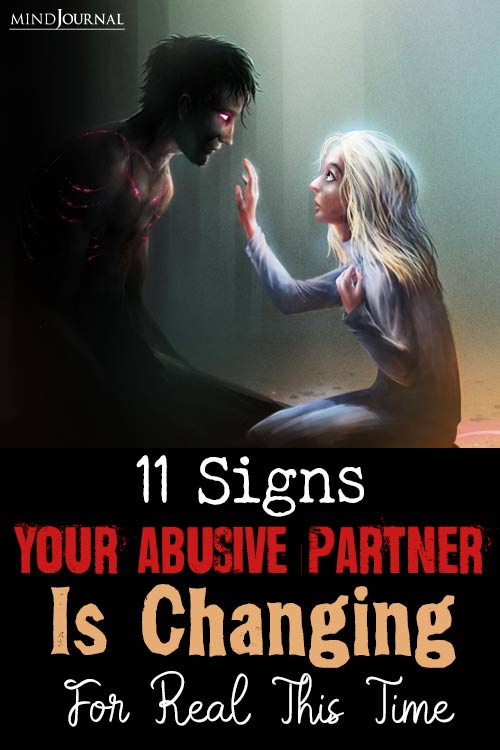

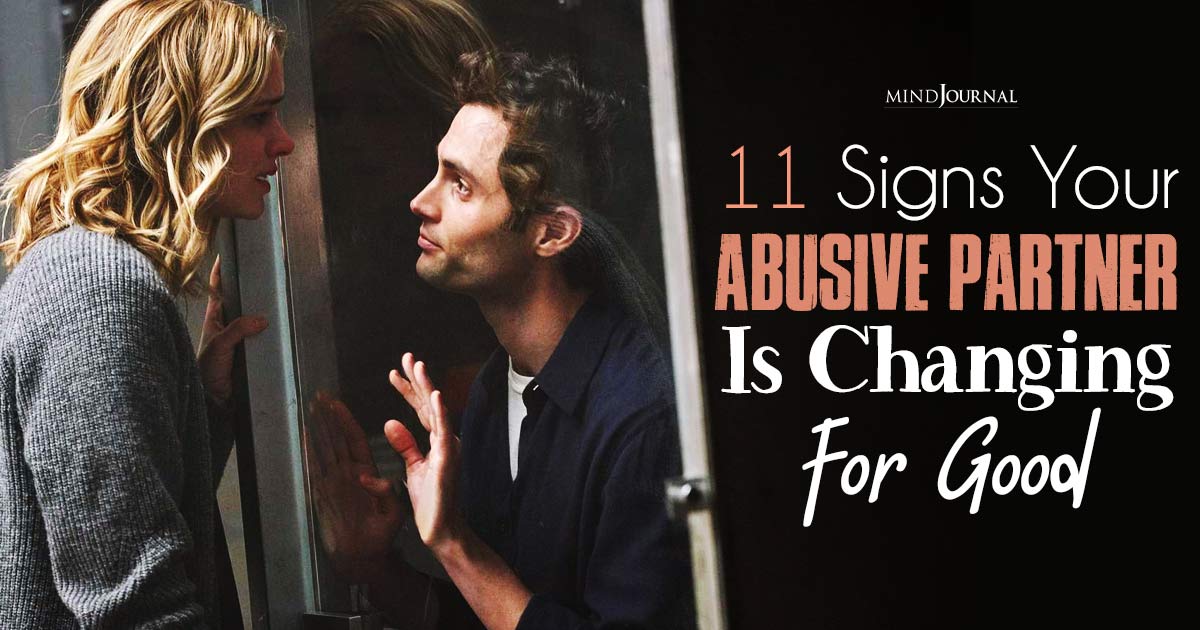







Leave a Reply
You must be logged in to post a comment.